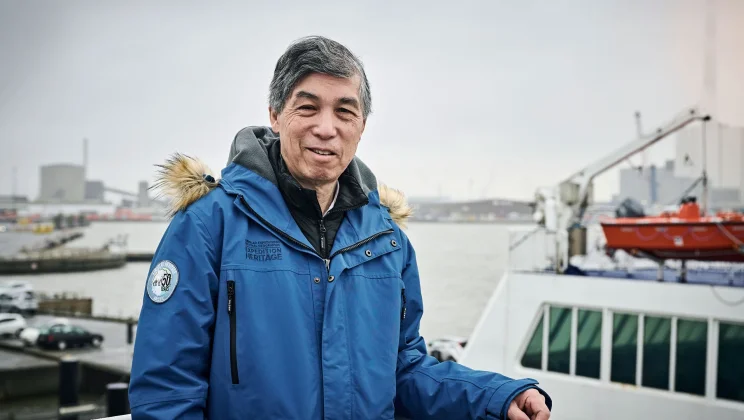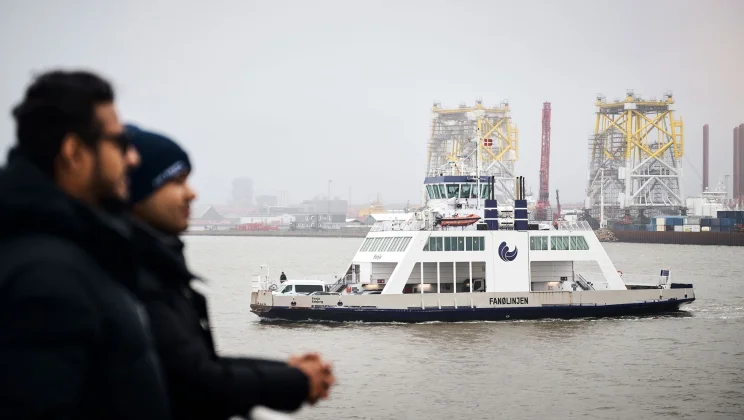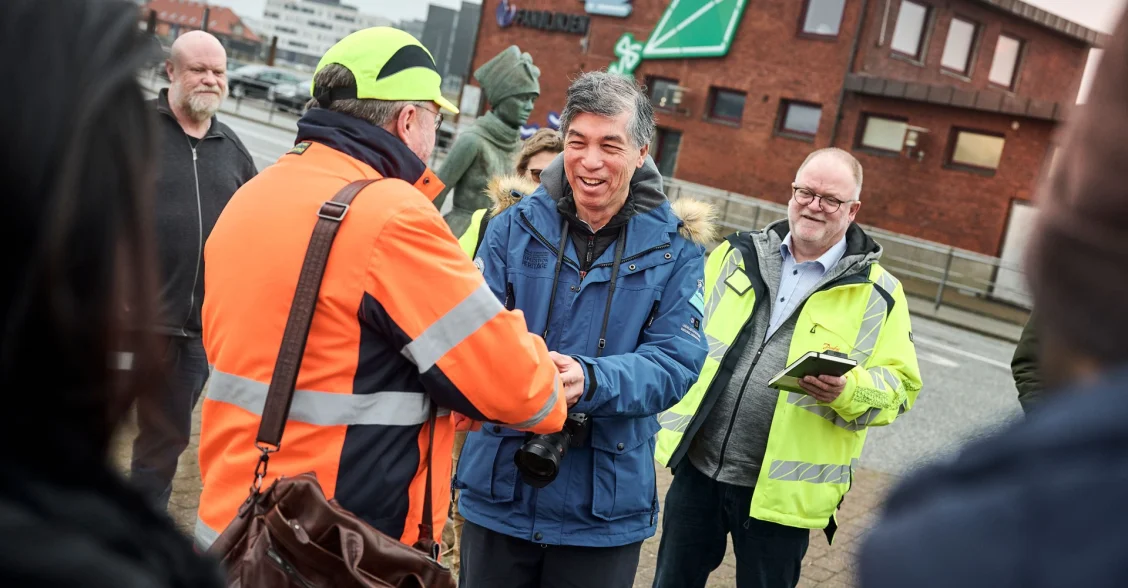Can the green transition withstand the challenges it currently faces, such as the war in Ukraine, geopolitical tensions and a new US president? Yes, according to Professor Willy Shih from Harvard Business School, who once again visited Port Esbjerg with a group of MBA students to witness the green transition in action.
Standing on the electric ferry between Fanø and Esbjerg, Professor Willy Shih gazes at the port, where a massive turbine component bound for the US looms large. This marks his third visit to Port Esbjerg with a group of MBA students within just two years.
They have come to Esbjerg to observe the green transition firsthand. And in the professor’s own words, they have come to the right place:
“We visit Esbjerg because here, we see in reality what we are used to seeing only on PowerPoint slides,” he says.
Professor Shih of Harvard Business School is a recognised expert in global supply chain management and industrial competitiveness. In this interview, he shares his perspectives on the challenges of the green transition under the current geopolitical pressures.
He and the 23 students visited utility company Din Forsyning’s seawater heat pump, which extracts heat from the North Sea for district heating. They also visited European Energy’s Power-to-X site, which produces hydrogen, and they explored a nacelle larger than a typical Danish house, waiting to be shipped to the US East Coast.
However, Shih and his students have arrived at the port during a time when geopolitical challenges are putting pressure on the green transition, and the incoming US administration signals new directions in energy and supply policies.
What does this mean for the green transition?
Shih shares his thoughts as the electric ferry quietly glides between the world’s largest offshore wind shipping port and the small neighbouring island of Fanø.
Geopolitical turmoil presents an opportunity
Despite the calm waters, the world is experiencing significant geopolitical turbulence.
Can the green transition withstand the pressures of geopolitical conflicts, such as Russia’s invasion of Ukraine? Does it strengthen or weaken the process?
“The war in Ukraine and the pressure it has placed on energy prices have, in many ways, been an opportunity for European and particularly Danish companies that have invested in technology and experimentation over the past decade and more. I see this new reality as a great opportunity to leverage what you have learned to move further ahead and innovate more,” says Shih.
He highlights European Energy’s Power-to-X project at Port Esbjerg as an example.
“You have many pilot projects here. The learning that comes from these projects is invaluable. You should figure out how to capitalise on those learnings as quickly as possible,” he adds.
Could these challenges actually accelerate the green transition by creating a greater need for energy security?
“Yes, I believe that all the geopolitical uncertainties are driving significant pressure to strengthen innovation and accelerate technological development. Here in Esbjerg, and in Denmark overall, you can translate this pressure into knowledge and competitive advantages because you have learned these lessons before anyone else.”

Harvard Business School professor Willy Shih during his visit to Port Esbjerg.
Exposure to global markets
What role does Port Esbjerg play in this context?
“Port Esbjerg is a role model because of its openness. The port welcomes visits, forms partnerships across borders and integrates international technology. That’s smart. You can only leverage your competitive advantages if you access the global market. Danish companies, to scale significantly, need to look beyond their domestic market, which only accounts for around two percent of their total revenues. In contrast, European and American companies rely far more on their home markets. Danish companies, therefore, depend on greater exposure to global markets,” says Shih.
“On the one hand, the new geopolitical reality brings greater risks and rapid changes. But on the other hand, you have the advantage of being ahead and well-informed about global developments. This advantage is driven by world-class R&D, where Danish companies are highly advanced – not just in fundamental research, but also in engineering. The ferry we are on right now is a pioneering project, and you learn a lot from undertaking such initiatives. It’s a challenging environment, but one that presents many opportunities for Danish companies,” he concludes.

Students from Harvard Business School watch the Fanø ferry sail past in Port Esbjerg.
Watch out for spillover effects from China’s dominance
China has entered the market and dominates sectors such as solar panels. What impact does this have – could it slow down the green transition?
“Yes, it could, and it likely will if other countries impose tariffs on imported solar panels or wind turbine components. This would delay the availability of affordable energy for more people,” Shih says .
However, he is more concerned about China’s lead in vehicle electrification, which could spill over into other industries.
“China has rapidly electrified its passenger cars and built significant capacity in battery production. This has given them clear advantages in scaling. Beyond passenger EVs, they are investing significantly in electrification of other sectors like heavy equipment. That’s significant and likely achieved with substantial state support. Western companies must pay close attention to this. If they want to lead the energy transition and catch up with China in some areas, they need to focus on power equipment – both large and small – across sectors like agriculture, construction and mining technology,” he explains.
The new US administration – What to expect?
With a new president in the US, what can we expect in terms of collaboration and development across borders?
“It’s an unusual time, and regardless of whom I speak to in the US, they struggle to predict what the new administration will do. It seems we are entering a transactional era where everything is negotiable, which will require a lot of flexibility. My advice is not to overreact to everything the president says. Instead, analyse the underlying problems he’s trying to address,” says Shih.
Regarding Greenland, Shih finds recent statements exaggerated but strategically significant.
“Donald Trump must know that Greenland is not for sale. What he is really indicating is that Greenland is strategically important due to its location, minerals and the Arctic focus. Again, the intent matters more than the words,” he comments.
A positive outlook for the green transition
Despite all the challenges – war, China’s dominance and a new US administration – Willy Shih remains convinced that the green transition will continue.
“Many companies have already invested heavily and are moving forward. For example, Maersk is leading the way in decarbonising container shipping with major investments in alternative fuels like methanol. Although customers are hesitant to pay more, the transition is well underway, and they won’t stop,” he says.
He is also optimistic about Port Esbjerg’s future.
“You have openness and partnerships, which keep you at the forefront of developments. You are flexible and can adapt when circumstances change. That’s evident from your history. So, despite all challenges, I am optimistic for you,” says Shih.
As the ferry docks, the visit to Esbjerg ends with a sense of optimism and determination.
Go to overview

